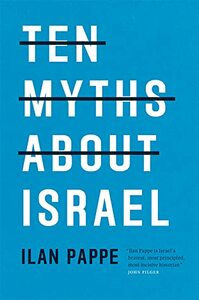Take a photo of a barcode or cover
challenging
informative
reflective
tense
medium-paced
challenging
informative
sad
slow-paced
Literally everything you need to know to have an intelligent conversation about and act accordingly on the Israeli-Palestine 'question'. Written by an Israeli historian exiled to the U.K., this is a short, engaging book that tells the story of Palestine's occupation/colonisation with historical accuracy. The basic tenet of the book is that we cannot ever hope to achieve peace if we use incorrect language, swallow myths whole and revel in historical inaccuracies. The book ends with a hopeful message for reconciliation, that can help us all move away from the legacy of colonialism, imperialism and the Holocaust. [The author argues much of what Israel is today is a legacy of European imperialism, anti-semitism and guilt over the horrors of WW2.] On a more personal level, for me the question of why Western countries largely support Israel when virtually all of them, especially those in Europe, engaged in centuries of anti-Semitism, is finally answered. [Hint: it's easier to deal with Jews when they're far away from you building their own state] Give this to your friends. Share widely. Correcting our ideas will be the best hope not just for the Palestinian people, but for us all to escape the legacy of imperialism, colonialism, anti-semitism and Islamophobia.
dark
emotional
reflective
medium-paced
This book made me hate isr*el more than I already do. And that’s saying something.
The audacity and cruelty of this psychopathic “state” is staggering. I wish for the downfall of isr*el everyday.
From the river to the sea.
The audacity and cruelty of this psychopathic “state” is staggering. I wish for the downfall of isr*el everyday.
From the river to the sea.
dark
informative
reflective
sad
fast-paced
informative
reflective
fast-paced
I do not wish to give a pro-Palestine book a low rating, so I won’t rate this at all. I will start by saying that I appreciate the author’s overall thesis and his research efforts. I did, however, find the execution of his points lacking for several reasons.
This small book packs a punch, with several succinct points made with an abundance of references and evidence. This is not a book I would recommend to people who are using it as their intro into the history of the Israeli-Palestinian conflict. It’s quite dense. (Though I will add that the timeline at the end of the book is quite helpful.) If you are someone who has a difficult time processing dense information while reading, I recommend taking the audiobook route with this one.
Now to discuss the book’s actual content.
I think part of the author’s blundering is in the structure of the book itself. It’s meant to expose ten myths, but many of the points made don’t actually counter the myths stated, specifically the myth that the Jews are a people without a land. Here, I felt the author was being very general with his statements and it felt disjointed by the rest of the book where everything else is very specific. His argumentation here felt sporadic and unorganized.
The author’s insistence that Hamas are freedom fighters and all actions they’ve taken are justified is one I disagree with. I will acknowledge, however, that this book was published in 2017, and therefore before the events of October 7th, 2023.
Some positives:
I learned A LOT. The history on the term “Zionism” as well as what zionists are was helpful, and I believe the myths regarding Zionism as a whole were argued well. I also appreciated the details regarding Zionism’s history in Europe and its relationship to Christian nationalism (which is quite prevalent here in the U.S.)
Overall, I think this book is useful and contains good arguments. I hope to read other histories in this vein and see if there are better ones out there. I almost wonder if this book would have been better if it was simply longer. I know the author has written others, so maybe I will look into those.
I appreciate a statement from the author’s conclusion. “The Jewish settlers are now an organic and integral part of the land. They cannot, and will not, be removed. They should be part of the future, but not on the basis of the constant oppression and dispossession of the local Palestinians.”
This small book packs a punch, with several succinct points made with an abundance of references and evidence. This is not a book I would recommend to people who are using it as their intro into the history of the Israeli-Palestinian conflict. It’s quite dense. (Though I will add that the timeline at the end of the book is quite helpful.) If you are someone who has a difficult time processing dense information while reading, I recommend taking the audiobook route with this one.
Now to discuss the book’s actual content.
I think part of the author’s blundering is in the structure of the book itself. It’s meant to expose ten myths, but many of the points made don’t actually counter the myths stated, specifically the myth that the Jews are a people without a land. Here, I felt the author was being very general with his statements and it felt disjointed by the rest of the book where everything else is very specific. His argumentation here felt sporadic and unorganized.
The author’s insistence that Hamas are freedom fighters and all actions they’ve taken are justified is one I disagree with. I will acknowledge, however, that this book was published in 2017, and therefore before the events of October 7th, 2023.
Some positives:
I learned A LOT. The history on the term “Zionism” as well as what zionists are was helpful, and I believe the myths regarding Zionism as a whole were argued well. I also appreciated the details regarding Zionism’s history in Europe and its relationship to Christian nationalism (which is quite prevalent here in the U.S.)
Overall, I think this book is useful and contains good arguments. I hope to read other histories in this vein and see if there are better ones out there. I almost wonder if this book would have been better if it was simply longer. I know the author has written others, so maybe I will look into those.
I appreciate a statement from the author’s conclusion. “The Jewish settlers are now an organic and integral part of the land. They cannot, and will not, be removed. They should be part of the future, but not on the basis of the constant oppression and dispossession of the local Palestinians.”
informative
medium-paced
Ten Myths about Israel is an accesible, clear, and concise explanation about Israel and Palestine, viewing the relationship through the perspective of settler colonialism. Introducing and then debunking myths was a good structure for this book because it allowed Pappé to cover a wide variety of topics. Additionally, he cited his sources and gave resources for where to learn more about specific topics which makes this book a good place to start to learn more about the history.
informative
sad
fast-paced







